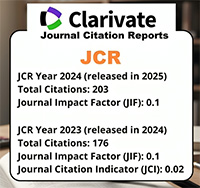Anti epstein-barr virus antibodies in the Venezuelan population
Resumen
Epstein-Barr virus (E BV) antibody titers were studied in 99 Venezuelan children and 98 adults of different ages and from both sexes. Antibodies to the viral antigens were determined by inmunofluorescent assays. It was observed that primary EBV infection occur early in life as evident from an antibody frecuency of 25% in males and 44.4% of females under one year of age. This antibody frecuency increases to nearly 90% by 2-5 years. Antibodies were observed in 100% of the sera from adults subjets. Antibody titers were higher in children than in adults. The serological pattern observed in the Venezuelan population did not differ from that previously established in other parts of the world. The observed early EBV infections are probably the result of a low socioeconomical status and crowed living conditions of the studied population.




















